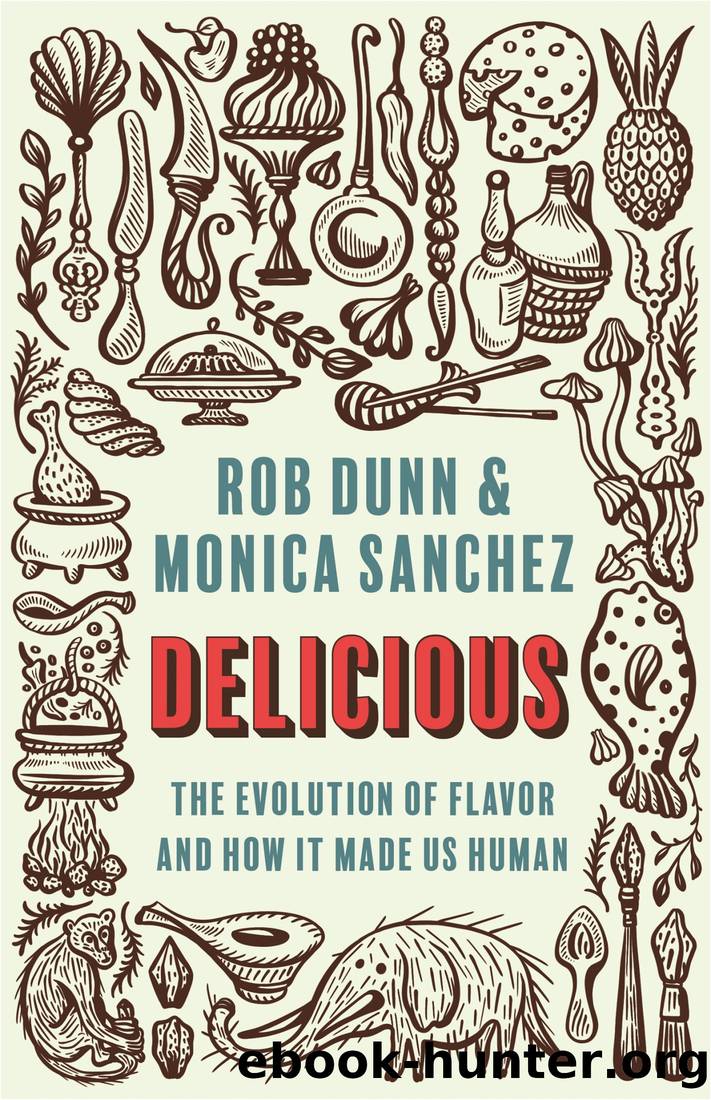Delicious by Rob Dunn

Author:Rob Dunn [Dunn, Rob]
Language: eng
Format: epub
ISBN: 9780691199474
Publisher: PrincetonUP
Published: 2020-12-08T00:00:00+00:00
None of this, however, explains why humans use chilies or black peppers as spices. It instead tells us something of the opposite, namely that plants produce the active ingredients in chilies, black pepper, and probably other spices that trigger similar effects not just as a warning signal, but specifically as a warning signal to our kind. âMammal, go away.â One explanation for why we use these spices is that they offer a specific new dimension to food, that of culinary danger.
We jump off bridges to test the bungee rope. Thanks to chemesthesis, we put many things in our mouths that seem like danger, but arenât, for a daily version of the same sort of thrill. This is the hypothesis suggested by evidence gathered by the psychologist Paul Rozin, evidence gathered by studying pigs, dogs, rats, humans, and two chimpanzees. Rozin focused on chilies, though he might have just as easily studied black peppercorns or Sichuan peppers.
In one study on humans, Rozin decided to try to understand how the spiciness of a pepper related to the perceived tastiness of the pepper. He selected a group of individuals that included both people who enjoyed spicy food and those who did not. He offered those people one cracker after another made with the capsaicin from chilies. As he did, he slowly increased the amount of capsaicin in the crackers that they were offered until people said, âNo more.â Then, he asked people which cracker was the tastiest. They might have simply disliked all of the spicy crackers. Or they might have all thought the same level of spiciness to be the tastiest (that level at which food preservation was most effective). Or their preferences might have been all over the board, random. None of these was the case. Instead, people tended to choose as tastiest the spiciest cracker they could tolerate. They liked a level of spiciness that was just shy of agony. This is the behavior that would be expected if people ate peppers to enjoy the dangerâs biochemical pleasures. Pain and fear tell us, respectivelly, to stop what we are doing and run. But they also trigger the release of endorphins and other brain chemicals. Perhaps eating chilies gives us the high of fleeing danger without the bother of exertion or the threat of actual death. Rozinâs sample size for this study wasnât enormous, but his results were interesting. It was on the basis of this study, and others like it, that Rozin suggested that chili peppers are well loved because they seem dangerous but arenât; they offer us what he has called âbenign masochism.â[145] This benign masochism, he argues, is a unique feature of humans. In short, Rozin thinks that we are simple enough to enjoy the consequences of hurting ourselves a little and smart enough to know that the hurt is not real and will eventually go away.
To like chilies, Rozin argues, a mammal has to learn to ignore the signs of danger, to know the signs are false.
Download
This site does not store any files on its server. We only index and link to content provided by other sites. Please contact the content providers to delete copyright contents if any and email us, we'll remove relevant links or contents immediately.
Whiskies Galore by Ian Buxton(40304)
Introduction to Aircraft Design (Cambridge Aerospace Series) by John P. Fielding(32332)
Small Unmanned Fixed-wing Aircraft Design by Andrew J. Keane Andras Sobester James P. Scanlan & András Sóbester & James P. Scanlan(32137)
Aircraft Design of WWII: A Sketchbook by Lockheed Aircraft Corporation(31768)
Craft Beer for the Homebrewer by Michael Agnew(17440)
Turbulence by E. J. Noyes(7033)
The Complete Stick Figure Physics Tutorials by Allen Sarah(6632)
The Institute by Stephen King(6240)
Kaplan MCAT General Chemistry Review by Kaplan(6045)
The Thirst by Nesbo Jo(5779)
Bad Blood by John Carreyrou(5763)
Learning SQL by Alan Beaulieu(5400)
Weapons of Math Destruction by Cathy O'Neil(5032)
Permanent Record by Edward Snowden(4987)
Man-made Catastrophes and Risk Information Concealment by Dmitry Chernov & Didier Sornette(4730)
iGen by Jean M. Twenge(4695)
Navigation and Map Reading by K Andrew(4550)
Digital Minimalism by Cal Newport;(4512)
Life 3.0: Being Human in the Age of Artificial Intelligence by Tegmark Max(4495)
